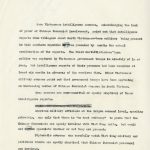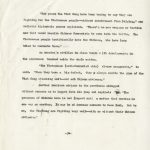1965, January 18, “Vietnamese Intelligence Officials, Unconfirmed Reports”
deepe
chicom–1
jan. 18, 1965
SAIGON–Vietnamese intelligence officials have been receiving an increasing number of unconfirmed reports that Chinese Communist “advisors” are accompanying hard-core Viet Cong Communist guerrilla units.
Both Vietnamese and American military officials, who reguarly regularly read intelligence reports information, emphasize that the reports of Chinese Communist “advisors” have not (repeat not) been confirmed by r standard intelligence procedures such a s captured capturing a prisoner or photographing a Chinese Communist trooper.or an sighting omm They emphasize that o no (repeat no) American or Vietnamese traps military men in the field have been able to identify one through binoculars. In the past, American advisors in the provinces have reported seeing Caucasians with the Viet Cong units.
However, Vietnamese military generals at the highest echelong –in the High Military Command headquuar headquarters–have privately voiced the “probability “probability” that the Chinese Communists have sent non-participating observers or military specialists to aid the Viet Cong guerrillas.
deepe
chicom–2
jan. 18, 1965
TheThis judgement of thisone high-ranking Vietnamese general at the Saigon headquarters–shared by Vietnamese generals commanding operations int he field–has been accepted by some military experts from Western allies and has been relayed in diplomatic reports to their home capitals.
The basis of the intelligence reports is generally from Vietnamese villagers who have witnessed Viet Cong operations. One Vietnamese general–one of four corps commanders–said he personally interviewed Vietnamese villagers who told him of tall Asian troopers soldiers accompanying the Viet Cong who worewearingChinese-like uniforms. These reports, which have dribbled into Vietnamese intelligence channels for months, peaked rit recently after the infamous battle of Binh Gia in which Vietnamese government forces sustained more than 400 casualties in one of the worst defeats of the war.
Following that battle, the Vietnamese High Command received reports from Vietnamese villagers, includo including at least one Vietnamese Roman Catholic priest, that the Viet Cong units included at least two Asian soldiers per battalion “with closely shaved head.” The villagers reportedly said that they spoke a different language which they could not understand, shoved and pushed the Vietnamese villagers rather than treating them diplomatically as in the other units of the members of the unit.
deepe
chicom–3
jan. 18, 1965
One Vietnamese general said that he talked with a Vietnamese Marine Officer unit who had escaped injury in the battle of Binh Gia, who said that he had personally heardthro radioon the radio Chinese being spoken during the Binh Gia battle. While some sources question that Chinese language would be spoken during the battle since it would be difficult to for the Viet Cong troops, who speak Vietnamese, to understand, theone Vietnamese ghe general said that it “is probably ture true” that there are Chinese Communists serving with Viet Cong units.
This correspondent also talked with a low-ranking American advisor who had participated in the battle of Binh Gia.
“There’s absolutely no (repeat no) evidence to prove there are Chicoms with the Viet Cong guerrillas,” the American captain explained. “But I know they are there. You can tell by the way they dig their foxholes and their tactics. During the battle tThey started their attack with a bugle blast and they were carryingwaving their regimental banner and came wave after wave just like in Korea. When we were retreating d their mortar shells followed in our footsteps down the trails. This is just like Korea.”
deepe
chicom–4
Some Vietnamese intelligence sources, acknowledging the lack of proof of Chinese Communist involvement, point out that intelligence reports from villagers about North Vietnamese-born soldiers being present in this southern republic re pres preceded by months of the actual confirmation of the reports. The first North– Vietnamese-born soldier was captured by Vietnamese government troops in mid-July of last year, but intelligence reports of their presence had been received at least six months in advance. of the confirma tion . Other Vietnamese military sources point out that government troops have been capturing an increasing number of Chinese Communist weapons in South Vietnam.
Some sources are non-committal or openly skeptical of these intelligence reports.
Diplomatic sources who say primennmm
American military officials at the Saigon command level, speaking privately, say only that there is “no hard evidence” to prove that the Chinese Communists are openly involved with Viet Cong units, but would not vemmm speculate whether or not they are present.
Diplomatic sources who carefully watch Viet Cong military and political trends are openly skeptical that Chinese Communist personnel are involved.
deepe
chicoms–5
“For years the Viet Cong have been trying to say they are fighting for the Vietnamese people–without involvement from Peip ing,” one reliable diplomatic source explained. “There’s no new weapons or tactics now that would require Chinese Communists to come into the battle. The Vietnamese people traditionally hate the Chinese, who have long tried to dominate them.”
An American civilian in close touch w ith developments in the provinces brushed aside the whole matter.
“The Vietnamese (anti-Communist side) always exaggerate,” he said. “When they have a big defeat, they a always double the size of the Viet Cong attacking unit–and add Chicom advisors.”
Another American advisor in the provinces shrugged without concern as he hopped into his jeep and replied: “Itx “The presence of chicoms here is not (repeat not) a matter that worries me one way or another. It may be of immense concern to Dean Rusk. But to me, the VietCong are fighting very well–with or without their Chicom advisors.”
-30-
Read Previous Article: 1965, January 11, “Miniature Invasion”
Read Next Article: 1965, February 13, “Strong Stable Government”





